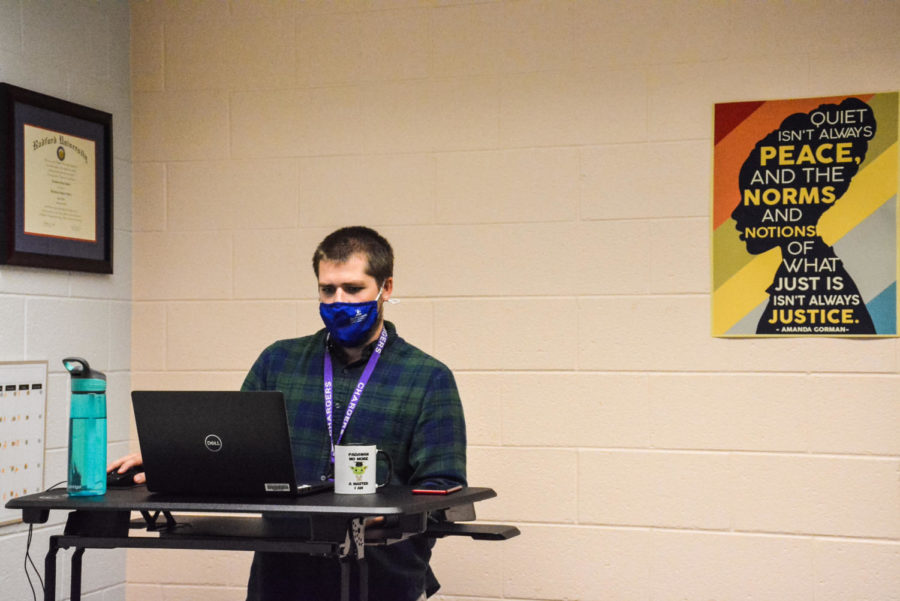In his office, social worker Nick Thayer prepares for his next meeting.
Nick Thayer
One of two social workers at the school, Nick Thayer, is passionate about community service and helping those who have experienced injustice. His office is located in Subschool 5.
What do your responsibilities include?
My day looks different every day. A lot of it might be counseling kids if they’re in crisis or setting up regular counseling hours with students who are eligible. I also facilitate groups in the school like restorative justice circles, something I’m looking to do more. Of course, there are a lot of consultations with parents, teachers and other faculty members about how to support students’ social and emotional needs.
I have a caseload of students that I’m responsible for checking on every now and then to make sure everything is going okay both at home, in school and in the community. I also make sure that students receive all the services that they need and try to create as equitable a school as possible.
When did you start doing social work?
I graduated from Radford University in 2017 with a bachelor’s in social work. From there I went to a place called Leeland House, a place for kids who are experiencing suicidal ideation, to be a youth counselor. I was there for about a year, and then I became a case manager at a homeless shelter in Loudon County called the Good Shepherd Alliance. I graduated from [George Mason University] in one year with my master’s in Social Work last year, and then I was an intern at Fairfax High School last year, and now I am here.
Why did you decide to be a social worker?
There’s a few reasons for [going into social work]. When I was about 13 or 14 years old, I was on a travel baseball team. Our coaches really emphasized community service and using community service as a way of team bonding. There was a Native American reservation we found out about called Pine Ridge, South Dakota, and we did some things to support some kids out there. One day we decided that as a team, we would like to go out there and actually see the reservation. Going out to South Dakota was the first time I saw that not everybody gets the things that they deserve, and somehow I was lucky enough to have all these things in my life. There are other people who are just as deserving of all those nice things but are not getting them. That was my first exposure to real injustice and wanting to do something about it.
Also, when I was in high school, one of my best friends struggled a lot with serious depression and anxiety. I found that the social worker at our school was really helpful for him, and the profession became what I wanted to do too.
You attended Westfield High School. How does Westfield compare to Chantilly?
I think it’s kind of an advantage for me to have come from Westfield to Chantilly because when I was at Westfield, it was the biggest school in Fairfax County, and now I’m here, where Chantilly is the biggest school in Fairfax County. I think that as privileged as a lot of students are and the great resources that they have in this county, there also comes an enormous amount of pressure. As someone who went to Westfield and grew up in this community, I understand what that pressure is like.
What is your favorite part of the job, and what is the hardest part of your job?
Overall, student interaction. I love talking to teenagers. I really think you all are the greatest generation we’ve ever had. You’re the most compassionate generation we’ve ever had. I think that you’re much better about talking about mental health than my generation was and other generations before. Interacting with you all fires me up to come to work.
There are definitely days when it can be sad. The students I’m supporting are in crisis situations or situations that are really tough to deal with most of the time. It can take an emotional toll on you as a social worker. Sometimes you have to find a way to step back from work. Social workers get into this work because we’re passionate about helping people, but we have to remember to help ourselves too.
How does a typical session with you go?
There are certain kids that I have regular counseling sessions with. They have specific goals in mind for things that we want to improve, whether they are social or communication skills. A student might be having a panic attack in the clinic and they need a social worker to come in and talk to them. I’ll sit with them for 15 minutes and get to the basis of what’s going on, process that with them, and try to help them feel better and see what the next steps are. Also, a lot of times kids just come to my office and say “I know you are my clinician, and I’d love to talk to you about something that is going on right now.”
What is something you would like to say to students?
As a kid in a school this size during a pandemic with all the emotional growth that comes with being a teenager, it can feel like you’re dealing with things alone and don’t have the support you need. There are so many people in this school that really care about the students, whether the students know it or not. If a kid is dealing with anything, whether it’s depression or anxiety, there’s somebody in this school that wants to help them. It just takes reaching out.
